DaBaby’s name has been saturating Google searches and trending topics on Twitter — and not for good reason. His recent homophobic rant at Rolling Loud has fans, festivals, and LGBTQ+ activists rightfully up in arms. Yet many of the people calling out DaBaby for his actions seem to have no problem with his and other music artists’ homophobic lyrics. The rush to hold the DaBaby accountable is performative at best and ultimately benefits no one. And, as 50 Cent pointed out “[DaBaby] will be back.”
In response to the backlash, other music festivals where DaBaby was slated to play cancelled his set, affirming that their venues are safe spaces where such inflammatory speech wouldn’t be permitted. While I’m elated to see DaBaby face consequences for his words and subsequent actions, I’m still left wondering why – when there’s a slew of other musicians who’ve done similar harm – DaBaby is the one held accountable.
Lollapalooza, one of the festival’s that effectively put DaBaby in the corner, still hosted Young Thug as one of its headliners. Just last year though, Young Thug misgendered Dwayne Wade and Gabrielle Union’s daughter after she came out, tweeting, “All I wanna say to dwade son is ‘GOD DONT MAKE MISTAKES’ but hey live your true self.” After a few hours, during which many called the rapper out for being transphobic, he deleted the tweet. The choice to keep Young Thug on the setlist, then, seems contradictory to Lolla’s claim that “[the festival] was founded on diversity, inclusivity, respect, and love.”
Austin City Limits (ACL) had Billie Eilish and Doja Cat headline this past Saturday. Though both pop artists are currently in social media’s good graces, they’ve both been caught in the waves of cancel culture several times this past year. Eilish has been questioned for queerbaiting, lip-syncing to slurs, and dating a man who actively used slurs against Asian, Black, and LGBT+ people. Doja Cat came under fire after video of her activity in potentially alt-right chatrooms was released. And an old song she wrote, “Dindu Nuffin,” received backlash for the very title — a term often used to mock AAVE and Black victims of police brutality.
Though ACL did not include an explanation when it announced DaBaby’s removal from the lineup, I still find myself bothered that harm from some artists is excusable. A white woman pop star is afforded understanding because of her age. An attractive light skinned woman’s harm is swept under the rug because her bops are too good not to listen to. Cancel culture’s allowances let active harm slip through the cracks and convey the message “if you’re palatable and/or profitable enough, your actions are excused.” And this holds true as long as the agent at play — in this case the music industry — occasionally sacrifices one of its own.
***
For DaBaby, one might say it’s a timing issue. After all, his rise to fame just began to excel in 2019 when his album KIRK debuted at No. 1 on the Billboard 200 and his name seemed to be on every feature from Dreamville’s “Under the Sun” to Megan Thee Stallion’s “Cash Shit” and “Cry Baby.” But his young career also means he hasn’t had the time to amass diehard, unconditionally loving fans. Others say that DaBaby simply isn’t talented enough to not be held accountable.
One meme currently making its rounds shows a photo of DaBaby on stage bannered with a mock newspaper headline reading “DaBaby Not Talented Enough Artist To Be Separated From Art.” Yet I can’t help but wonder how much DaBaby’s identities also play a large role here.
DaBaby is a dark-skinned Black man with several tattoos, and for a while Twitter trolls were out here saying his head looks like a P.T. Cruiser. Like many Black people in the world of social media, much of DaBaby’s fame is tied to his memeability and the ease with which the audience-at-large is willing to make jokes at his expense. We also know that across industries, famous Black people — particularly Black men — are more likely to be punished for wrongdoings and punished more severely.

I can’t help but think of Lil Nas X’s brief conflict with F.K.A. Twigs and her “Cellophane” design and concept team. A ten second clip of Lil Nas X pole dancing down to hell to sit on the Devil’s lap became fuel for accusations that Nas didn’t attribute proper credit to artists and stole his video ideas from others. While finding appropriate artistic attributions was a necessary act, many people were all too ready to find extreme fault with Lil Nas X and claim him unoriginal.
Of course, DaBaby’s actions present and some past are objectively and obscenely wrong. And I don’t mean to minimize the visceral and continued harm beliefs like DaBaby’s cause. I do, however, want to interrogate why DaBaby’s words stick out and how the music industry’s response illustrates inconsistencies in accountability measures. When the only actions taken are performative ones, we allow the cycle of harm without restorative justice to continue. What happens to artists post-initial aftermath and does the industry even care about long-term accountability structures?
Morgan Wallen is an on-the-rise country star whose career touches these two points. In February this year, the White artist was recorded on camera using the N-word during a “three day bender.” Despite being suspended from his label and banned from the radio, he won three Billboard awards. And with 2.3 billion streams, Dangerous is the most played album of any genre this year beating out Olivia Rodrigo’s Sour and Justin Bieber’s Justice. And unlike DaBaby, when I typed Wallen’s name into Google, I had to scroll to the second page before a single article came up regarding his actions. Dangerous: The Double Album is sitting pretty at number six on the Billboard 200 chart as well, eight months after its release.
Dua Lipa was one celebrity roped immediately into DaBaby’s situation. Lipa had previously featured DaBaby on one of her tracks “Levitating” which went viral on TikTok after its release and continues to frequent as background music to the app’s trends. Her fans called on her to release a new version of the hit without the DaBaby’s verse on it, reminding Lipa of her large, dedicated LGBTQ+ fanbase.
Not days later, Lipa had released a statement saying she was “shocked and horrified” at DaBaby’s remarks and affirming her support of the LGBTQ community. But like the several festivals who removed DaBaby from their longstanding lineups, Lipa’s words and actions are, at best, performative. She still just collaborated with Pop Smoke’s estate, adding another track to his posthumous lineup. Yet Pop Smoke had sung lyrics such as “can’t fuck with these niggas ’cause niggas is gay” in his hit song “Dior.”
These acts of pseudo-accountability are a decent place to start, but do little to address the root problems. Getting caught in the throes of “cancel culture” rather than focusing on genuine accountability means no internal or interpersonal growth actually occurs. It also teaches those who may have caused egregious harm in the past that if they work with the right people or wait around long enough, their actions will be forgotten. The same will likely happen for DaBaby. Even though he’s since deleted the formal apology to the LGBTQ+ community on his Instagram, it’s likely only a matter of time before another, bigger controversy takes DaBaby’s place and allows him to slip back into the limelight.
